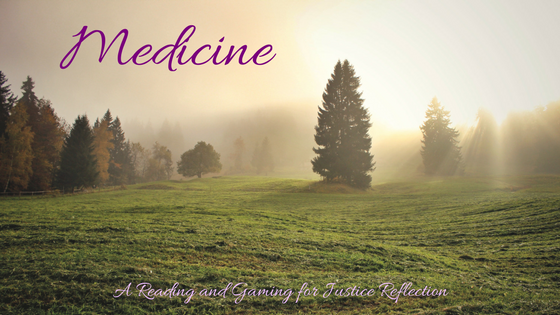
I recently have been listening to this podcast called Healing Justice (https://www.healingjustice.org/) which talks about how can we center healing in our social change movements. The host, Kate Werning, talks to different activists and organizers about their work and their healing practices through their work. I find this to be very important as I have found work for social change, justice, and liberation to be exhausting and at some points harmful. One episode in particular, Voices from Liberation School, asked two questions of participants: ‘What medicine do you bring?’ and ‘What medicine do you need?’ This allowed participants to really center the healing that they bring and the healing that they need to the work they are engaged with. How might this apply to board games or books you ask? Since issues of oppression and marginalization are seep into every aspect of life, I often find myself thinking about care of my community and acre of myself as we push for positive social change. Hobbies are usually where people can find a relaxing environment to recharge, but for marginalized folks, this might not always be the case.
I thought I would take some time to reflect on these questions as a healing practice in my constant work for justice and liberation.
What medicine do I bring?
I am a bridge.
I seek to connect folks and to create understanding or at least the yearn for understanding in this work. One of the most harmful phenomena I have seen over the past year is the idea of ‘cancelling’ people – cutting people off for any mistake that causes harm. I think this is a direct result of us not having structures and support to address the people who caused the harm and to listen and take responsibility when we cause harm. We have all caused harm at some point in our experience – there is really no way around this because we cannot and we will not know everyone’s experience. We use our own to inform how we act and how we speak to others. This can and will cause harm, especially in interactions where two people come from drastically different experiences. And it is hard to deal with harm and it is hard to hear that I harmed another person.
In my opinion, this further polarizes our communities, particularly with people who are generally moderate, not hateful, and care about inclusion of all people. In my work, I constantly ask the question, at what point do we need to reach out and bring people (both the harmed and the harmers) back into the center of healing? I seek to be that bridge that helps my communities seek understanding of one another. I seek to be the bridge that creates deep dialogues about social issues and unintended harm caused. I honestly see this as the only way forward; to coexist in a world where people, based on social identities, have vastly different experiences. What I have found in my work is that two people who share a relationship are far more likely to sit and listen to a perspective or experience they do not agree with. They are more likely to sit and try to understand how a person could form that perspective through their lived-experiences. In my opinion, bridging is needed to support those relationships to start building empathy across boundaries of difference.
What medicine do I need?
Deep rest.
My partner tells me that I am tired all of the time and while that seems like an exaggeration, there is truth behind her observations. Some component of this has to do with actual sleep but I think a bigger component is directly related to always being ‘on’ when it comes to inclusion and positive community change. My professional work includes a focus on inclusion and social justice and then I choose to take that work into my hobbies. Hobbies are supposed to be spaces where I can relax and recharge BUT I find it really hard to relax and recharge in spaces that still rely of the dynamics of power and marginalization. The board game and book hobbies are microcosms of our larger culture are race, gender identity, socioeconomic status, ability, sexual orientation, and other social identities. It is hard to relax in an environment that actively marginalizes me. Whether it is a theme of a game or a group that unintentionally (or sometimes intentionally) causes harm… these are considerations folks make before entering spaces.
I guess the question comes down to: what am I looking for when I say deep rest? Time and space to be myself without worry of harm for myself and my communities AND the ability to not focus on work for inclusion in that space. I think this requires surrounding myself with people who understand me and who support me unconditionally – this will allow me to just be without the expectation of doing inclusion work.
What medicine do you bring?
What medicine are you seeking?
Wonderful Post! I wasn’t familiar with the podcast, will definitely check it out. It’s really problematic how as you mentioned we hardly get to relax during hobbies either. For a lot of us I think social media is also one of these spaces that is both medicine and harmful, thus the social media breaks.
LikeLike
Posted by Bina | January 31, 2018, 10:31 AM